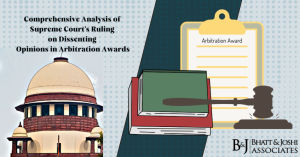Arbitration: An Alternative Dispute Resolution Method
Introduction
Arbitration is a procedure in which a dispute is submitted, by agreement of the parties, to one or more arbitrators who make a binding decision on the dispute. Arbitration is often used as an alternative to litigation, which is the process of resolving disputes in court. Arbitration and litigation have their own advantages and disadvantages, depending on the nature and circumstances of the dispute. In this article, I will explain what arbitration is, how it works, and what are its pros and cons. I will also discuss a recent judgment of the Allahabad High Court on the issue of arbitration.
What is Arbitration?
Arbitration is a method of resolving disputes outside of court where an arbitrator makes a decision after hearing the evidence and arguments of both sides. The arbitrator is usually a neutral third party who is chosen by the parties or appointed by an institution that administers arbitration. The arbitrator may be a lawyer, a judge, an expert, or any other person who has the relevant knowledge and experience to deal with the dispute. The arbitrator’s decision is called an arbitral award, which is final and binding on the parties, subject to limited grounds of challenge or appeal.
Arbitration is based on the agreement of the parties, which means that the parties must consent to submit their dispute to arbitration. This consent may be given before or after the dispute arises, usually in the form of an arbitration clause in a contract or a separate arbitration agreement. The parties may also agree on various aspects of the arbitration process, such as the number and qualifications of the arbitrators, the rules and procedures to be followed, the language and venue of the arbitration, and the applicable law and jurisdiction.
How Does Arbitration Work?
The arbitration process may vary depending on the type and complexity of the dispute, the rules and procedures agreed by the parties, and the practices of the arbitrator or the institution. However, a typical arbitration process may involve the following steps :
- Notice of Arbitration: The party initiating arbitration (the claimant) sends a notice of arbitration to the other party (the respondent), stating its intention to arbitrate, identifying the dispute and the relief sought, and proposing an arbitrator or a method of appointing one.
- Response to Notice of Arbitration: The respondent replies to the notice of arbitration, accepting or rejecting arbitration, agreeing or disagreeing with the proposed arbitrator or method of appointing one, admitting or denying the claim, and raising any counterclaim or defense.
- Appointment of Arbitrator(s): The parties agree on an arbitrator or a panel of arbitrators (usually one or three), or request an institution to appoint one for them. The arbitrator(s) must be independent and impartial, and disclose any potential conflict of interest.
- Statement of Claim: The claimant submits a statement of claim to the arbitrator(s) and the respondent, setting out the facts and legal arguments in support of its claim, along with any evidence and documents.
- Statement of Defense: The respondent submits a statement of defense to the arbitrator(s) and the claimant, setting out its response to the claimant’s statement of claim, along with any evidence and documents. The respondent may also submit a counterclaim against the claimant if it has one.
- Statement of Reply: The claimant may submit a statement of reply to respond to the respondent’s statement of defense and counterclaim if it wishes to do so.
- Hearing: The arbitrator(s) conduct a hearing where they hear oral arguments from both parties and examine witnesses and experts if any. The hearing may be held in person, by video conference, or by telephone, depending on the circumstances. The hearing may also be waived by mutual agreement of the parties if they prefer to have a document-only arbitration.
- Award: The arbitrator(s) deliberate on the case and issue an award within a reasonable time. The award must be in writing and signed by the arbitrator(s). It must also state the reasons for the decision unless otherwise agreed by the parties. The award must be delivered to both parties.
- Enforcement: The award is binding on both parties and can be enforced as if it were a court judgment in most countries that are signatories to international treaties on arbitration, such as [the New York Convention]. However, either party may challenge or appeal the award on limited grounds under [the Arbitration and Conciliation Act], such as lack of jurisdiction, procedural irregularity, excess of authority, fraud, corruption, or violation of public policy.
What are the Pros and Cons of Arbitration?
It has many advantages over litigation as a way of resolving disputes. Some of the benefits are :
- Speed: Arbitration is usually faster than litigation, as it avoids the delays and backlogs of the court system. The parties can also agree on a timeline for the process and expedite it if necessary.
- Cost: Arbitration is usually cheaper than litigation, as it reduces the legal fees and expenses involved in a court case. The parties can also share the cost of the arbitrator(s) and the institution, and limit the scope and duration of the process.
- Flexibility: Arbitration is more flexible than litigation, as it allows the parties to customize the arbitration process according to their needs and preferences. The parties can choose the arbitrator(s), the rules and procedures, the language and venue, and the applicable law and jurisdiction of the arbitration.
- Privacy: Arbitration is more private than litigation, as it keeps the dispute and its outcome confidential from the public. The parties can also agree to keep the arbitration proceedings and documents secret, and prevent any disclosure or publication of the award.
- Amicability: Arbitration is more amicable than litigation, as it minimizes hostility and confrontation between the parties. The parties can also maintain or restore their relationship and cooperation after resolving their dispute through arbitration.
However, arbitration also has some disadvantages compared to litigation. Some of the drawbacks of arbitration are :
- Finality: Arbitration gives up the right to appeal, as it makes the award final and binding on both parties, subject to limited grounds of challenge or appeal. The parties may not be satisfied with the award or may find errors or mistakes in it, but they have to accept it as it is.
- Fairness: Arbitration may lack fairness, as it may be biased or unfair in favor of one party over the other. The arbitrator(s) may not be truly independent or impartial, or may have a conflict of interest or a hidden agenda. The process may also be skewed or manipulated by one party who has more power or resources than the other.
- Discovery: Arbitration may limit discovery, as it may restrict or deny access to information and evidence that is relevant or material to the dispute. The parties may not be able to obtain full disclosure or production of documents, interrogatories, depositions, or inspections from each other or from third parties.
- Remedies: Arbitration may limit remedies, as it may reduce or restrict the types or amounts of relief or damages that are available or appropriate for the dispute. The arbitrator(s) may not have the authority or discretion to grant injunctions, specific performance, punitive damages, or other forms of relief that a court can grant.
- Consent: Arbitration may be imposed without consent, as it may be forced or coerced on one party by another party who has more bargaining power or influence. The party may not be aware or informed of the clause or agreement, or may not understand its implications or consequences.
A Recent Judgment on Arbitration
A recent judgment of the Allahabad High Court on the issue of arbitration is [India Oil Corporation Ltd. And Another vs. The Commercial Court And Another], decided on March 18, 2023 by Mr. Justice Neeraj Tiwari. In this case, the court held that an arbitral award is not a decree under Section 2(2) of the Code of Civil Procedure (CPC), and therefore, an objection filed under Section 47 of the CPC is not maintainable.
Section 2(2) of the CPC defines a decree as “the formal expression of an adjudication which, so far as regards the Court expressing it, conclusively determines the rights of the parties with regard to all or any of the matters in controversy in the suit”. Section 47 of the CPC deals with questions relating to the execution, discharge or satisfaction of a decree. These questions are to be determined by the court executing the decree and not by a separate suit.
The court observed that an arbitral award can only be challenged under Section 34 of the Arbitration and Conciliation Act, 1996, which provides the grounds and procedure for setting aside an arbitral award. Section 34 states that “Recourse to a Court against an arbitral award may be made only by an application for setting aside such award in accordance with sub-section (2) and sub-section (3)”. Sub-section (2) lists the grounds for setting aside an award, such as incapacity of the parties, invalidity of the arbitration agreement, lack of proper notice of the appointment of the arbitrator or of the arbitral proceedings, inability to present one’s case, excess of authority by the arbitrator, irregularity in the composition of the arbitral tribunal or the procedure, or contravention of public policy. Sub-section (3) states that “An application for setting aside may not be made after three months have elapsed from the date on which the party making that application had received the arbitral award or, if a request had been made under section 33, from the date on which that request had been disposed of by the arbitral tribunal”.
The court also noted that Section 36 of the Arbitration and Conciliation Act, 1996, states that “Where the time for making an application to set aside the arbitral award under section 34 has expired, or such application having been made, it has been refused, the award shall be enforced under the Code of Civil Procedure, 1908 in the same manner as if it were a decree of the court”. Therefore, the court concluded that an arbitral award is not a decree itself, but only acquires the status of a decree for the purpose of enforcement.
The court relied on the Supreme Court’s decision in [Fiza Developers and Inter-Trade Pvt. Ltd. vs. AMCI (India) Pvt. Ltd. and Anr], where it was held that “The scheme of Section 36 shows that the legislative intent is clear i.e. the award becomes enforceable as a decree on expiry of the time for filing an application under Section 34(1) to challenge the award or such application having been made, it has been refused. The use of the words ‘as if’ in Section 36 clearly indicate that till enforcement, it remains an award and does not become a decree”. The court also cited other judgments of various High Courts that supported its view.
The court dismissed the objection filed by the appellants under Section 47 of CPC against the execution of an arbitral award passed in favor of the respondents. The court held that such objection was not maintainable and that the appellants should have challenged the award under Section 34 of the Arbitration and Conciliation Act, 1996, within the prescribed time limit.
Conclusion
Arbitration is an alternative dispute resolution method that has many benefits and drawbacks compared to litigation. Arbitration is based on the agreement of the parties, who can customize and control various aspects of the arbitration process. Arbitration is usually faster, cheaper, more flexible, more private, and more amicable than litigation. However, arbitration also gives up the right to appeal, may lack fairness, may limit discovery and remedies, and may be imposed without consent. Arbitration is governed by the Arbitration and Conciliation Act, 1996, which provides for the grounds and procedure for challenging and enforcing arbitral awards. Arbitral awards are not decrees under Section 2(2) of CPC, but only become enforceable as decrees under Section 36 of the Arbitration and Conciliation Act, 1996. Objections relating to execution, discharge or satisfaction of arbitral awards are not maintainable under Section 47 of CPC, but only under Section 34 of the Arbitration and Conciliation Act, 1996.










